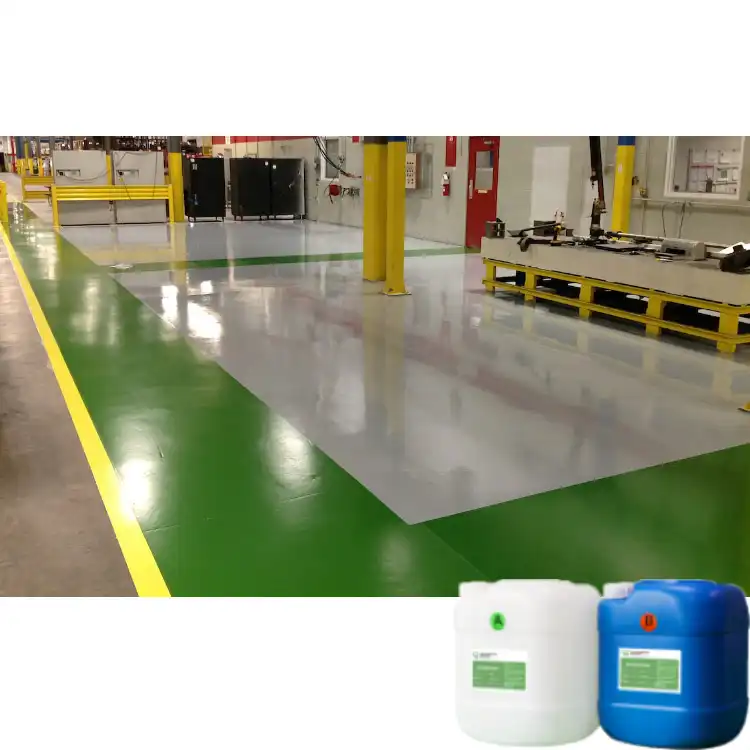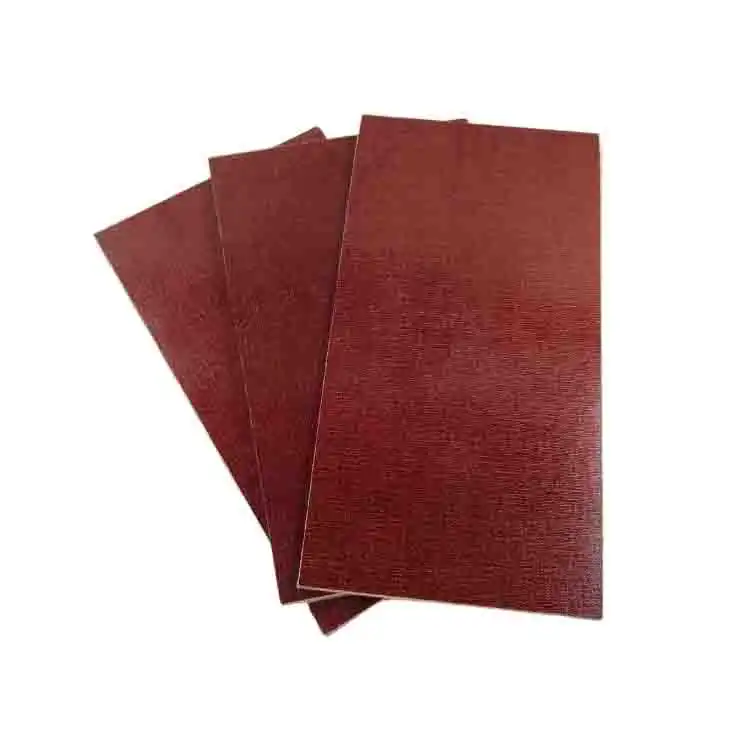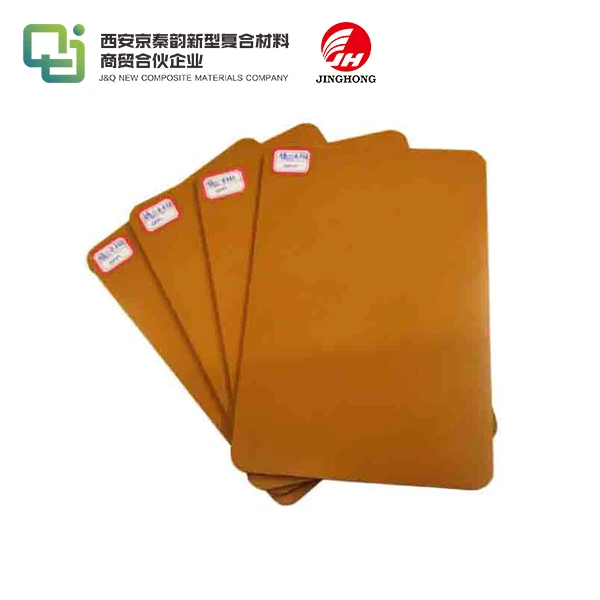Is Bakelite Sheet Waterproof?
2024-07-19 14:12:58
Bakelite sheets are well known for their exceptional electrical insulating qualities, exceptional heat resistance, and durability. That being said, a common query is whether Bakelite sheets are watertight. Determining the appropriateness of Bakelite in different applications—particularly those that involve exposure to moisture or water—requires an understanding of the material's water resistance. We shall discuss the ramifications of Bakelite sheets' waterproof properties for various applications in this article.
What Are the Properties of Bakelite Sheets Regarding Water Resistance?
Bakelite, also known as phenolic resin, is a thermosetting plastic that was created in the early 20th century by Belgian chemist Leo Baekeland. Formaldehyde and phenol undergo a condensation reaction to form a rigid and long-lasting material. However, what are its characteristics regarding water resistance?
Chemical Composition and Structure The structure of bakelite is a significant factor in its resistance to water. The phenolic resin creates a dense, cross-linked network that is highly resistant to water and many other environmental factors. However, despite Bakelite's inherent resistance to water, there are a number of factors that can influence its degree of water resistance:
- Fillers and Additions: The water resistance of bakelite sheets can be affected by fillers like asbestos, cotton fabric, or wood flour. There is a possibility that some fillers will take in water, lowering the overall resistance to water.
- Care for the Surface: The water resistance of it can be improved by finishing their surface. When compared to rough, untreated surfaces, smooth, polished surfaces resist water penetration more effectively.
Water Assimilation Rates
Bakelite sheets ordinarily show low water retention rates. Bakelite's 24-hour water absorption rate can range from 0.5% to 1.5%, according to various sources. Because Bakelite has a low absorption rate, it is able to resist water penetration to a certain extent, making it suitable for applications where it is anticipated that it will be exposed to moisture on occasion.
Long-Term Water Contact Despite their resistance to short-term water contact, which can eventually degrade when immersed in or in continuous contact with water for an extended period of time. Water can seep into the material over time, especially if the surface hasn't been sealed or treated properly. The material's structure and properties may gradually deteriorate as a result.
Practical Uses and Resistance to Water In practical applications, Bakelite sheets are frequently utilized in settings where they may come into contact with moisture or water. However, their application is typically restricted to situations involving minimal direct and prolonged water exposure. Bakelite, for instance, is utilized in electrical insulators, switchboards, and kitchenware, where it is not submerged in water but may experience occasional splashes or humidity.

How Does Bakelite Sheet Function as an Electrical Insulation?
Due to their excellent insulation properties, which are utilized extensively in the electrical industry. They are an excellent material for a variety of electrical applications due to their resistance to electrical currents and ability to withstand high temperatures. We will investigate the significance of the water resistance of the products and how they are used as electrical insulation in this section.
Electrical Insulation Properties The outstanding insulation properties of bakelite are the primary reason why it is utilized in the electrical industry. Because it is non-conductive and can withstand high voltages without failing, it is an essential part of many electrical systems and devices.
Electrical Panels and Switchboards Bakelite sheets are frequently utilized in the construction of electrical panels and switchboards. In order to safeguard users from electrical shocks and prevent short circuits, these panels need to have reliable insulation. Because switchboards and panels may be exposed to moisture or humidity, Bakelite's water resistance also plays a role in this case.
Electrical Insulators Bakelite sheets act as a barrier between conductive materials in electrical insulators, preventing electrical currents from traveling in unintended directions. This is especially important in high-voltage applications, where even a trace amount of moisture could cause the insulating properties to be compromised and result in hazardous conditions.
Insulation for Transformers Materials that can withstand high temperatures and provide excellent electrical insulation are necessary for transformers. Transformers insulate coils and other components with the products. In humid environments, the material's resistance to water absorption aids in maintaining its insulating properties.
Electrical Uses of this products because of their resistance to water, these sheets are more suitable for electrical use. Electrical insulators' performance can be significantly affected by moisture by increasing the likelihood of short circuits and decreasing their resistance. Because of its low water absorption rate, bakelite maintains its insulating properties even in damp or humid environments.
Outdoor Electrical Components Rain, dew, and humidity are common hazards for outdoor electrical components. They are used to keep moisture out of outdoor electrical enclosures, junction boxes, and other parts. When properly sealed and treated, the material's inherent resistance to water ensures reliable performance in outdoor settings.
Electrical components are frequently subjected to harsh conditions, such as saltwater, chemicals, and high humidity, in marine and industrial settings. Due to their resistance to chemicals and water, which are utilized in these settings. As a result, they are ideal for insulating electrical systems in industrial plants, offshore platforms, and ships.
Examples and Case Studies There are a number of real-world examples that show how well Bakelite sheets work as electrical insulation:
- Historically Used in Telephones and Radios: In the early 20th century, bakelite was extensively utilized as an insulating material for telephone and radio components. These devices remained functional in a variety of environments thanks to its resistance to water.
- Present-day Electrical Panels: Bakelite sheets are still utilized in contemporary electrical panels and switchboards due to their reliable insulation and moisture resistance.
- Electrical Systems for Ships: Bakelite sheets are utilized in marine applications to insulate ship electrical systems, ensuring safety and dependability even in the presence of seawater and high humidity.

Are There Any Limitations to Using Bakelite Sheets in Water-Exposed Environments?
Despite the fact that Bakelite sheets offer significant advantages in terms of electrical insulation and resistance to water, their application in environments that are exposed to water is constrained in some ways. It is simpler to make informed decisions regarding their applications when you are aware of these limitations.
Long-Term Water Openness Despite their temporary resistance to water openness, which can degrade when immersed in water for an extended period of time or when in constant contact with it. Bakelite is not suitable for applications where it will be constantly submerged or exposed to water due to this limitation.
Deterioration Gradually Exposed to Water For an extended period of time, Bakelite's structure may gradually deteriorate. It's possible that the material will eventually fail, lose its ability to act as an insulator, and degrade. In critical applications, where failure could pose safety risks, this is especially crucial.
Surface Treatments and Coatings which can be coated or sealed with water-resistant sealants to mitigate the effects of prolonged water exposure. These medicines increment the material's protection from water and expand its life expectancy in clammy circumstances. However, the quality of their application and upkeep determines how effective these treatments are.
Bakelite Is Impervious to Water and Synthetics Bakelite is impervious to numerous synthetic substances, however water-based synthetic compounds like acids and salts can change its properties. Bakelite might not work as well in situations where water contains a lot of these things. When selecting Bakelite for applications that are exposed to water, it is essential to take into consideration the specific conditions of the environment.
Comparison with Other Materials In some situations, applications involving prolonged water exposure may be better suited for other materials than Bakelite. For instance:
Polymers include: For applications requiring constant water openness, PVC and polyethylene, two instances of plastics with unrivaled water obstruction, might be more qualified.
The components: For structural applications, metals that have been treated or coated appropriately can offer excellent water resistance and durability.
- Materials for Composites: Contemporary composite materials are suitable alternatives to Bakelite because they can be engineered to provide specific properties, like high water resistance.
Inspection and Maintenance Bakelite components used in water-prone environments must be inspected and maintained on a regular basis. Wear and the environment can have an impact on the material's performance over time. Bakelite components remain safe and effective with the assistance of routine maintenance and inspections.
Preventative Measures Bakelite sheets can last longer in challenging environments by taking preventative measures like sealing joints, applying protective coatings, and avoiding direct water contact. The material's properties must be preserved while these measures must guarantee reliable performance.
Examples and case studies include the following limitations and preventative measures:
- Electrical Enclosures in Conditions of Humidity: Bakelite enclosures may require additional surface treatments and sealing in highly humid environments to maintain performance.
- Has to do with the sea: Bakelite components used in marine applications rarely degrade when exposed to saltwater.
- Working Environment: Bakelite components are regularly inspected and maintained in industrial settings, where they are exposed to chemicals in water, to ensure their longevity.

Conclusion
Because of their exceptional water resistance and versatility, bakelite sheets are a great material for many uses, especially in the electrical sector.
To use them effectively, though, one needs to be aware of their limitations when it comes to extended immersion in water. With proper maintenance and consideration for the environment, Bakelite sheets may be made to perform better and last longer when they come into contact with water.
References
1. The History and Uses of Bakelite. (n.d.). Retrieved from [Science History Institute](https://www.sciencehistory.org/historical-profile/leo-hendrik-baekeland-and-bakelite)
2. Bakelite: The Material That Changed the World. (2023). Retrieved from [American Chemical Society](https://www.acs.org/content/acs/en/education/whatischemistry/landmarks/bakelite.html)
3. Applications of Bakelite Sheets. (2022). Retrieved from [ResearchGate](https://www.researchgate.net/publication/322658616_Applications_of_Bakelite_Sheets)
4. Phenolic Resins in Industrial Applications. (2021). Retrieved from [Construction Specifier](https://www.constructionspecifier.com/phenolic-resins-in-industrial-applications/)
5. The Versatility of Bakelite in Modern Manufacturing. (2020). Retrieved from [Industry Week](https://www.industryweek.com/technology-and-iiot/the-versatility-of-bakelite-in-modern-manufacturing)







